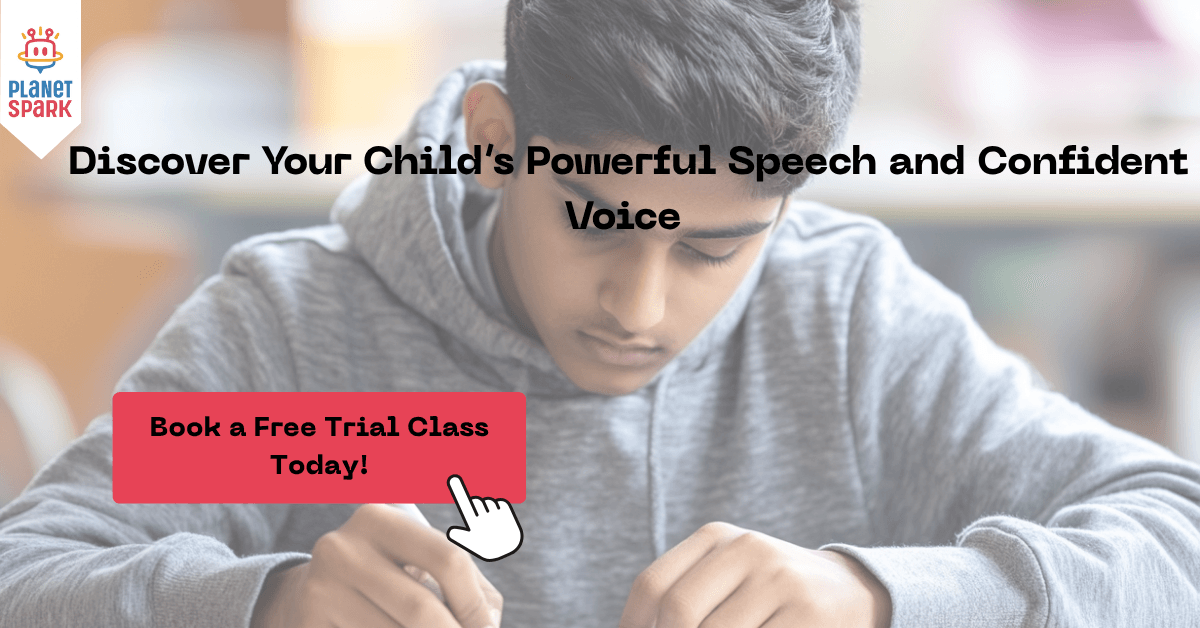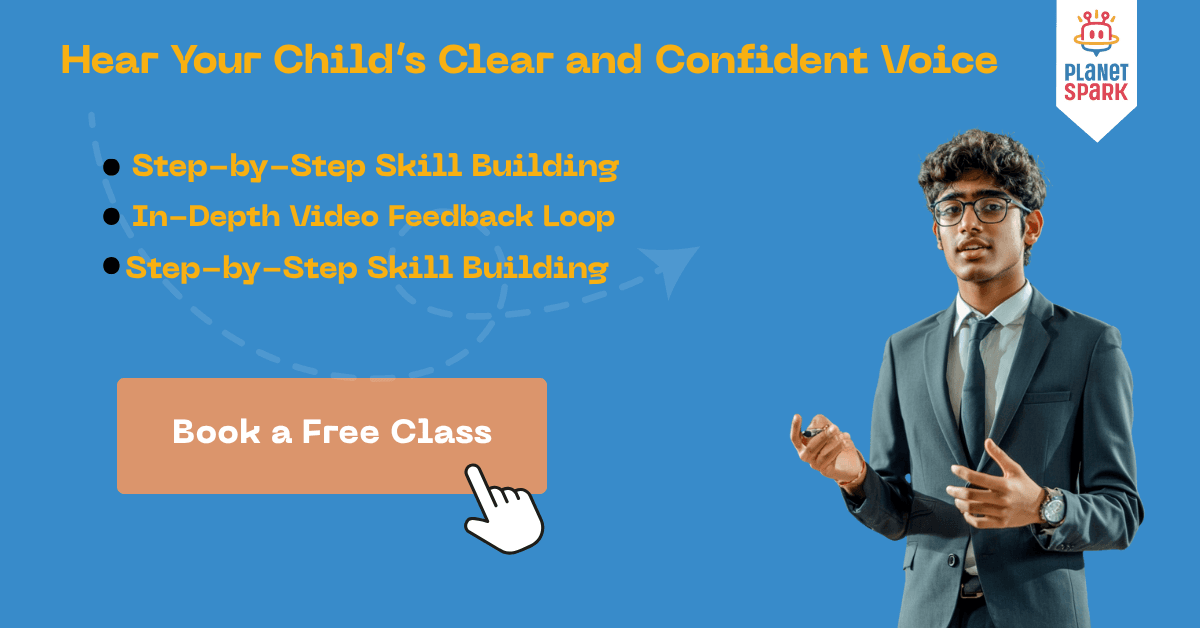Persuasive Speech Topics for Class 10 Teens | PlanetSpark

The teenage years, typically from 13 to 19, are widely considered the most transformative phase in a person's life. It's a time of rapid growth—emotionally, physically, and intellectually. Teens begin to explore the world beyond their families and immediate environments, engage with real-world issues, and discover their identities. They also begin to shape their opinions and express themselves more confidently. For Class 10 students, persuasive speech becomes a powerful outlet to voice these growing ideas and convictions.
Public speaking during the teenage years helps teens become effective communicators, critical thinkers, and confident leaders. Through persuasive speeches, they learn how to construct logical arguments, anticipate counterpoints, and inspire action. It also prepares them to engage in intellectual discourse, express empathy, and develop social awareness. With schools increasingly adopting holistic education models, persuasive speaking skills are no longer optional—they are essential.
This article offers a comprehensive list of persuasive speech topics for Class 10 students, tips for delivering strong speeches, and valuable resources from PlanetSpark to build these essential skills. We also explore how students can build speech-writing and delivery skills through structured programs and communities, leveraging AI tools, writing journals, and more.
Why Persuasive Speech is Crucial for Teens
Teenagers are at a stage where they are curious, opinionated, and highly influenced by their surroundings. Their views about the world are forming rapidly, and persuasive speech training enables them to channel their thoughts in productive directions. Encouraging them to participate in persuasive speech exercises can:
- Enhance their communication and public speaking skills
- Build their confidence to share opinions
- Develop logical reasoning and critical thinking abilities
- Encourage empathy by exploring diverse viewpoints
- Improve writing, vocabulary, and grammar
- Prepare them for academic, social, and professional challenges
- Help them understand societal issues from different perspectives
PlanetSpark’s writing and public speaking courses are specially designed to help teens become articulate, expressive, and confident individuals. With personalised 1:1 training and engaging content, students learn how to construct, present, and perfect their speeches with ease. The interactive and gamified structure of our sessions ensures students stay engaged while learning valuable skills.

List of Persuasive Speech Topics for Class 10 Students
Here is a thoughtfully curated list of persuasive speech topics, ideal for Class 10 students. These topics aim to spark curiosity, inspire critical thinking, and engage teens in meaningful discourse. Each category explores a different facet of teenage life, allowing students to explore both personal and global issues.
Social Awareness and Personal Development
- Should teens be given self-defense training?
Empowers students to think about personal safety, gender equality, and independence. - How important is mental health awareness for teens?
Encourages students to reduce stigma, prioritize emotional well-being, and create support networks. - Are teen girls more active than teen boys?
Initiates debate on gender dynamics in physical and social spaces, promoting awareness. - Gratitude is the key to happiness.
Promotes emotional intelligence, mindfulness, and personal reflection. - Should teens be more involved in physical activities?
Highlights the connection between physical and mental well-being. - Should sex education be made compulsory for teens?
Opens discussion on consent, respect, health, and informed decision-making. - How should teenage life be utilized?
A self-reflective topic that promotes goal setting, time management, and purpose. - Do hobbies contribute to a teenager’s growth?
Encourages self-discovery and life balance through creative outlets. - Is peer pressure more harmful than helpful?
Explores the influence of peers and ways to build assertiveness. - Do uniforms restrict teen individuality?
Discusses conformity, self-expression, and discipline.
Technology and Modern Lifestyle
- Why are teens becoming addicted to mobile phones?
Explores digital dependency and its psychological impact. - Is cellphone usage hampering the overall development of teens?
Analyses distractions, sleep deprivation, and communication breakdowns. - Should teens study on digital tablets like iPads rather than books?
Discusses the pros and cons of digital learning tools and their long-term effects. - Can social media shape teenage self-esteem?
Highlights the dual nature of online identity and self-worth. - Is online learning as effective as classroom learning?
Weighs flexibility, engagement, and accessibility. - Should video games be considered a sport?
Opens a conversation about esports, screen time, and cognitive benefits.
Real-World Events and Impacts
- How has the global pandemic (Covid-19) affected education for teens?
Reflects on online learning, digital gaps, and academic resilience. - What is the importance of pocket money during adolescence?
Promotes financial literacy, independence, and budgeting habits. - Teens are the future of a developing economy.
Explores the contribution of youth to innovation and development. - How can teens be made aware of growing corruption and how to avoid it?
Develops social responsibility, critical thinking, and moral values. - Is climate change a responsibility teens should be concerned about?
Drives activism, sustainability, and ecological awareness. - Should voting age be lowered to 16?
Promotes civic participation and political engagement.

Tips for Writing and Delivering Persuasive Speeches
Strong speeches don't happen by accident—they are planned, practiced, and polished. Here are some important strategies for Class 10 students:
- Know Your Audience: Understand your listeners’ background, interests, and possible biases. This helps tailor content and tone accordingly.
- Structure Your Argument: Start with a compelling hook, then move into your main argument with supporting evidence. Conclude with a call to action.
- Use Emotive Language: Emotions are powerful persuaders. Connect with your audience using metaphors, stories, or relatable scenarios.
- Practice Voice Modulation: Avoid a monotonous tone by changing your pace, pitch, and pauses.
- Maintain Eye Contact and Confident Body Language: These boost speaker credibility and audience connection.
- Use Real-Life Examples: Add anecdotes or statistics that reinforce your point.
- Anticipate Counterarguments: Prepare rebuttals to potential objections. This shows depth and awareness.
- Use Visual Aids if Allowed: Diagrams, charts, or props can enhance clarity.
- Time Your Speech: Stay within the allowed time limit by rehearsing with a timer.
- Seek Feedback: Practice in front of friends, family, or mentors and refine based on their input.
PlanetSpark: Your Partner in Public Speaking Success
At PlanetSpark, we believe that every child has the potential to become a confident communicator. To unlock that potential, we provide a comprehensive ecosystem that blends human expertise, technology, and gamification.
1:1 Personal Trainers for Every Child
- Each student is assigned a certified communication trainer
- Trainers adapt to the learner’s pace, interests, and strengths
- Lessons are personalised and feedback is given in real-time
- Sessions cover storytelling, fluency, articulation, grammar, and confidence
Personalised Curriculum and Learning Roadmap
- Starts with a diagnostic assessment to spot learning gaps
- A tailored roadmap is created and updated based on progress
- Students move through structured levels in public speaking and writing
SparkX – AI-Enabled Video Analysis Tool
- Children upload videos of their speeches
- AI evaluates clarity, tone, posture, fluency, and structure
- Detailed performance reports are shared with parents and students
- Ensures measurable improvements over time
AI-Led Practice Sessions for Speech and Storytelling
- Simulated activities with an AI coach
- Respond to prompts, deliver speeches, and receive automated feedback
- Encourages consistent practice and self-assessment
Spark Diary – Nurturing Writing Habits Digitally
- Digital journal embedded into the student dashboard
- Students write poems, stories, blogs, and speeches
- Helps develop reflective writing and creative thinking
Gamified Learning for Maximum Engagement
- Activities include Grammar Guru, Word Wizard, and Spell Knockout
- Points, badges, and rewards enhance participation
- Quizzes make learning vocabulary, grammar, and reading fun
Structured Parent-Teacher Meetings (PTMs)
- Held regularly to share student progress and set future goals
- Parents receive insights into child performance and improvements
- Helps maintain transparency and parental involvement
Comprehensive Progress Reports
- Detailed rubrics for content, grammar, delivery, confidence, and structure
- Personalised action plans and trainer notes for improvement
- Reports shared every few weeks
Exclusive Learning Clubs and Communities
- Debate Club, Story Writing Club, Comedy Club, and Writers Guild
- Kids interact with peers, participate in challenges, and collaborate
- Encourages leadership, creativity, and team dynamics
Sparkline – Safe Content Sharing Platform for Kids
- A closed digital space where children post performances and writings
- Moderated interactions ensure safety and positive engagement
- Peer feedback builds confidence and community spirit
Contests, Showcases, and Real-Time Recognition
- Monthly contests in storytelling, speech, writing, and debate
- Virtual open mics and talent showcases
- Students receive certificates, badges, and public recognition
Bonus Tools: SparkBee & SparkShop
- SparkBee: Fun-filled quizzes to build core English skills
- SparkShop: Offers grade-wise eBooks for grammar, writing, and comprehension
- Makes English learning accessible, interactive, and affordable
Conclusion
Teenage years are full of energy, idealism, and growing awareness of the world. Channeling this energy through persuasive speech practice enables teens to find their voice, develop resilience, and become future-ready leaders. When teens are encouraged to explore social, personal, and global topics through speech, they become more confident, analytical, and empathetic.
With PlanetSpark’s full-circle ecosystem—expert mentors, AI tools, gamified learning, personalised curriculum, and community spaces—your child gets the best-in-class support to thrive as a public speaker and writer.
Don't miss out on honing your public speaking skills! Book a FREE class now and master the art of persuasion!
FAQs
Q1. Why are persuasive speech topics important for Class 10 students?
A: They help students develop critical thinking, public speaking, self-expression, and social awareness.
Q2. What are some easy persuasive speech topics for teens?
A: Topics like mobile phone addiction, physical activity, gratitude, and peer pressure are relatable and impactful.
Q3. How long should a persuasive speech be for a Class 10 student?
A: Ideally, 3–5 minutes, with a clear introduction, structured body, and powerful conclusion.
Q4. What makes a persuasive speech impactful?
A: Emotional appeal, factual support, logical structure, and confident delivery all play a vital role.
Q5. How can PlanetSpark help my teen become a better speaker?
A: Through personalised training, AI tools, writing platforms, feedback-driven sessions, and live events.
Q6. Can teens participate in contests and events at PlanetSpark?
A: Yes, PlanetSpark hosts frequent contests, open mics, and collaborative learning clubs for maximum exposure.
Q7. Is there a free trial class available at PlanetSpark?
A: Absolutely! Book a free public speaking session to explore our world-class learning experience.
Personalized Communication Report
Record a video to get a AI generated personalized communication report for your child

Hi There, want to try these
tips for your child with
LIVE with our expert coach?
Let's check your child's
English fluency
